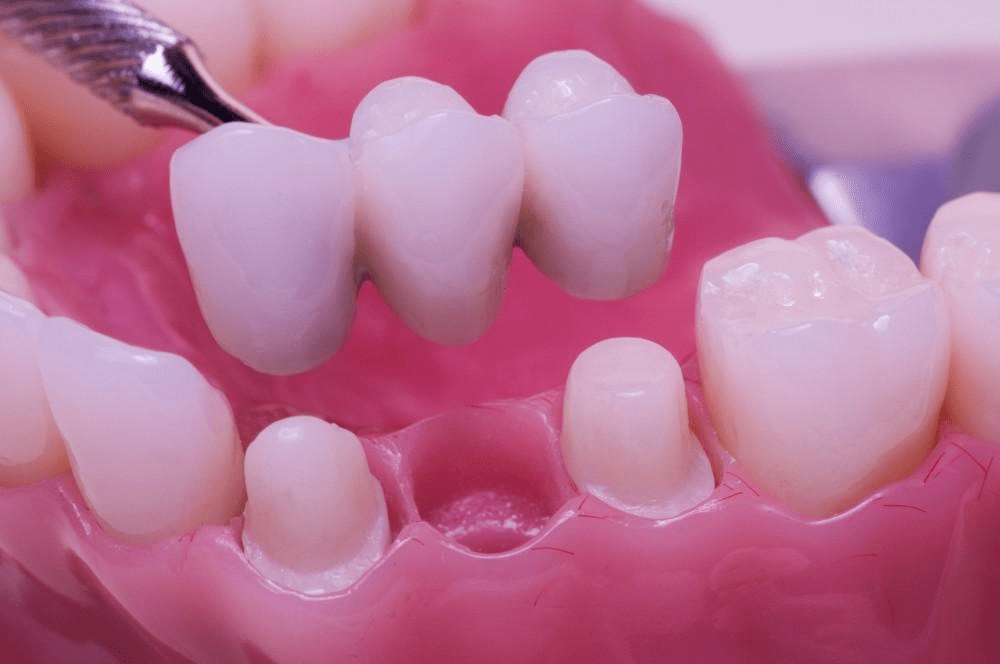Curious about the different Types of Dental Bridges and which one might be right for you? Understanding the various Types of Dental Bridges can help you make an informed decision about your dental health, as each type offers unique benefits and solutions for missing teeth.
Types of Dental Bridges: Traditional Dental Bridges
Traditional dental bridges are one of the most common types of dental bridges used to replace missing teeth. This type of bridge typically consists of one or more artificial teeth held in place by dental crowns that are cemented onto the adjacent natural teeth. Traditional dental bridges are highly effective for restoring the function and appearance of your smile, making them a popular choice among the various types of dental bridges available.
When considering the different types of dental bridges, it’s important to understand how traditional dental bridges work and their benefits. They provide a stable and durable solution for missing teeth, ensuring that you can chew and speak properly. For a more detailed comparison between dental bridges and other tooth replacement options, you can read our comprehensive guide on Dental Bridge vs Implant | A Complete Comparison.
Cantilever Dental Bridges
Cantilever dental bridges are a type of dental restoration used to replace missing teeth. Unlike traditional bridges that are supported by crowns on both sides, cantilever bridges are anchored by a crown on only one side. This makes them a suitable option for areas in the mouth that experience less stress, such as the front teeth.
When considering your options for dental bridges, it’s important to understand the different types available. Cantilever bridges offer a unique solution for specific dental needs. For more information on the various types of dental bridges, visit our page on Arlington Dental Bridges.
Maryland Dental Bridges
Maryland Dental Bridges are a popular option among the various types of dental bridges available. This type of bridge uses a metal or porcelain framework to anchor the replacement tooth to the back of adjacent natural teeth. Known for their conservative approach, Maryland Dental Bridges require minimal alteration to the surrounding teeth, making them an appealing choice for many individuals seeking to restore their smile.
Implant-Supported Bridges
Implant-supported bridges are a popular option among the various types of dental bridges available. Unlike traditional bridges that rely on adjacent teeth for support, implant-supported bridges are anchored directly into the jawbone using dental implants. This method provides a stable and durable solution for missing teeth, ensuring a natural look and feel. If you’re exploring the different types of dental bridges, consider learning more about implant-supported options. For more information, visit Advance Dental Care Center, your trusted Arlington Dentist.
Fixed Dental Bridges
Fixed dental bridges are a common solution among the various types of dental bridges available for replacing missing teeth. These bridges are permanently anchored to the adjacent teeth or dental implants, providing a stable and durable option for restoring your smile. Unlike removable options, fixed dental bridges remain in place, offering a more natural feel and appearance. This type of dental bridge is ideal for those looking for a long-term solution to maintain the function and aesthetics of their teeth.
Removable Dental Bridges
When exploring the types of dental bridges available, removable dental bridges stand out as a versatile and cost-effective option. These bridges, also known as partial dentures, can be taken out for cleaning and maintenance, making them a convenient choice for many patients. Removable dental bridges are typically recommended for individuals who may not be suitable candidates for fixed bridges due to insufficient bone support or other dental health issues. They are custom-made to fit your mouth comfortably and blend seamlessly with your natural teeth, providing both aesthetic and functional benefits. If you’re considering the various types of dental bridges, discussing removable options with your dentist can help you determine if this solution aligns with your needs and lifestyle.
Materials Used in Bridges
When exploring the types of dental bridges, it’s essential to understand the materials used in their construction, as this can significantly impact both aesthetics and durability. Dental bridges are commonly made from porcelain, ceramic, gold, or a combination of these materials. Porcelain and ceramic bridges are popular for their natural appearance, closely mimicking the look of real teeth, making them ideal for front teeth replacements. Gold and metal alloys, on the other hand, offer exceptional strength and longevity, often preferred for molars where chewing forces are greater. By considering the types of dental bridges and the materials used, you can make an informed decision that best suits your dental needs and lifestyle.
Lifespan of Dental Bridges
When considering the types of dental bridges, it’s essential to understand their lifespan to make an informed decision. Typically, dental bridges can last anywhere from 5 to 15 years, depending on the type of material used and how well you maintain your oral hygiene. Porcelain-fused-to-metal bridges and all-ceramic bridges are popular choices due to their durability and aesthetic appeal. Regular dental check-ups and proper care can significantly extend the lifespan of your dental bridge, ensuring you get the most out of your investment.
Cost Factors of Bridges
When considering the types of dental bridges, it’s essential to understand the cost factors involved. The price of dental bridges can vary significantly based on the material used, the complexity of the procedure, and the number of teeth being replaced. Traditional bridges, which use crowns on either side of the gap, tend to be more expensive due to the additional dental work required. On the other hand, cantilever and Maryland bridges might be more cost-effective but may not be suitable for all patients. Additionally, insurance coverage and geographic location can also impact the overall cost. By evaluating these factors, you can make a more informed decision about which type of dental bridge is right for you.
Conclusion
Understanding the different Types of Dental Bridges can help you make an informed decision about your dental health. Call 703-415-0505 or visit our Google Maps page to read reviews.

